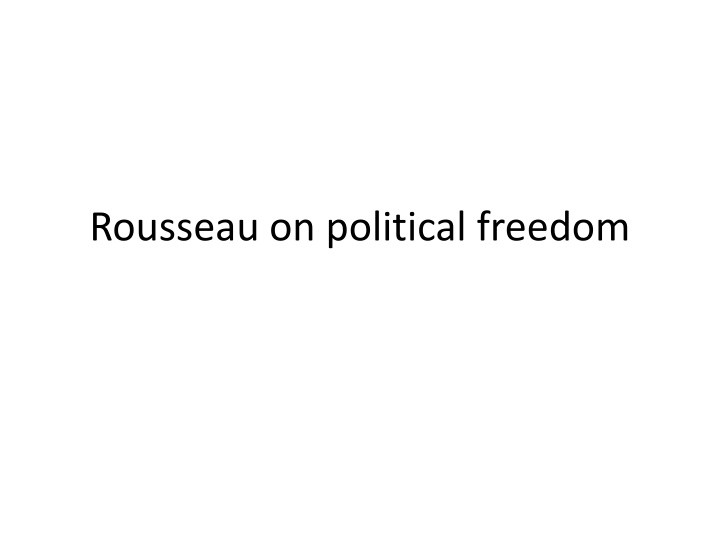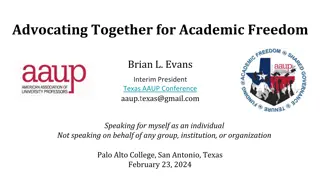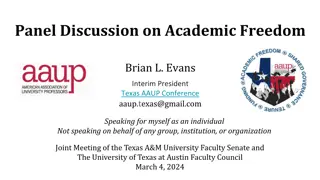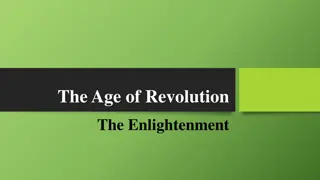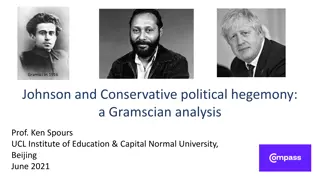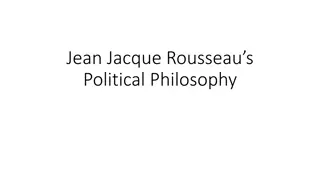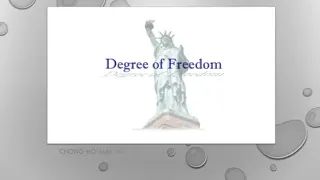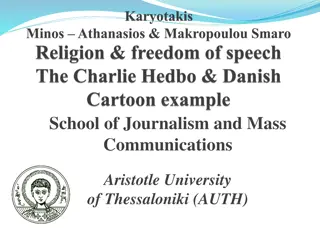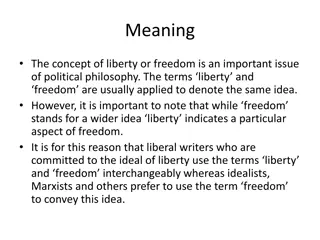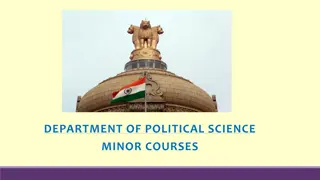Rousseau on political freedom
In Rousseau's perspective, four types of freedom are discussed including natural freedom, civil freedom, democratic freedom, and moral freedom. He explores the concept of legitimacy, rejecting the notion of voluntary servitude and emphasizing the importance of obeying only legitimate authorities.
Download Presentation

Please find below an Image/Link to download the presentation.
The content on the website is provided AS IS for your information and personal use only. It may not be sold, licensed, or shared on other websites without obtaining consent from the author.If you encounter any issues during the download, it is possible that the publisher has removed the file from their server.
You are allowed to download the files provided on this website for personal or commercial use, subject to the condition that they are used lawfully. All files are the property of their respective owners.
The content on the website is provided AS IS for your information and personal use only. It may not be sold, licensed, or shared on other websites without obtaining consent from the author.
E N D
Presentation Transcript
1. Four types of freedom (1) Natural freedom Independence enjoyed by human beings in the pure state of nature - has no other bounds than the individual s forces. (SC, 54) Absence of any moral obligation to limit one s freedom to do what one desires to do and judges to be the best thing to do Absence of constraints generated by relations of interdependence (2) Civil freedom Law-governed freedom (presupposes the state) laws protect individuals from arbitrary interference by others
(3) Democratic freedom Freedom enjoyed as member of the collective body (sovereign) that determines the laws to which its members are subject consists in right and power to determine the laws to which one is subject Freedom in sense (2) depends on freedom in sense (3): civil freedom is limited by the general will. (SC, 54) (4) Moral freedom Obedience to a law that one has prescribed to oneself in accordance with some rational principle (broader than (3)): [M]oral freedom alone makes man truly the master of himself; for the impulsion of mere appetite is slavery, and obedience to the law one has prescribed to oneself is freedom. (SC, 54)
Problem: The current condition of humankind is such that human beings have lost their natural freedom without becoming free in all of the other senses mentioned above (cf. Second Discourse) Man is born free, and everywhere he is in chains. One believes himself the others master, and yet is more a slave than they. (SC, 41) In order to solve this problem, Rousseau attempts to explain the grounds of legitimacy of a just civil and political order If this order is a legitimate one, we would be morally obliged to obey what it commands us to do or forbids us to do
2. Question of legitimacy One is obliged to obey only an authority whose power is legitimate Rejection of right of the stronger and voluntary servitude In social contract tradition before Rousseau (e.g. Grotius and Hobbes), there was held to be no real difference between sovereignty established by institution and sovereignty established by acquisition/conquest - both were held to involve voluntary subjection to the will of another For Hobbes, the act of subjection would be voluntary only in the sense that it would be caused by the desire to preserve one s own life Since it is my desire, I act according to my own will, not that of another person (wrong type of desire?)
Force produces no genuine right (obligation) It obliges a person (or people) to obey someone else only so long as it is necessary or prudent for him or her to obey: Force is a physical power; I fail to see what morality can result from its effects. To yield to force is an act of necessity, not of will; at most it is an act of prudence. In what sense can it become a duty? (SC, 44) A legitimate social order cannot, therefore, be based on a right of the stronger It must instead be based on convention more precisely, on genuine consent
Freedom is an essential part of the human beings nature: This common freedom is a consequence of man s nature. His first law is to attend to his own preservation, his first cares are those he owes himself, and since, as soon as he has reached the age of reason, he is the sole judge of the means proper to preserve himself, he becomes his own master. (SC, 42) There can be no possible compensation for someone who renounces everything. Such a renunciation is incompatible with the nature of man, and to deprive one s will of all freedom is to deprive one s actions of all morality. Finally, a convention that stipulates absolute authority on one side, and unlimited obedience on the other, is vain and contradictory. (SC, 45-6)
Therefore, a legitimate civil and political order must be compatible with: (1) The individual s interests His first law is to attend to his own preservation, his first cares are those he owes himself . (2) The individual s freedom to determine how he or she secures these interests he is the sole judge of the means proper to preserve himself, he becomes his own master , (3) The individual s moral freedom (the right to judge for oneself what is the right or wrong thing to do, what one ought or ought not to be) to deprive one s will of all freedom is to deprive one s actions of all morality (4) Absence of domination a convention that stipulates absolute authority on one side, and unlimited obedience on the other, is vain and contradictory
If all of these conditions were met, an individual would have good reasons for giving up his or her natural freedom Reasons and not desires are what count Idea of social contract explains how individuals can voluntarily renounce their natural freedom while remaining free The problem to which social contract provides the solution is can therefore be stated as follows: To find a form of association that will defend and protect the person and goods of each associate with the full common force, and by means of which each, uniting with all, nevertheless obey only himself and remain as free as before. (SC, 49-50)
3. The social contract (or pact) Pact of association A people is first constituted as a people - that is, as a single, unified collective body (the sovereign) by means of the social contract This act must be based on unanimity (everyone must agree to the terms of the social contract) Majority decisions may, however, then be valid, provided the [L]aw of majority rule is itself something established by convention, and presupposes unanimity at least once. (SC, 49)
Importance of equality: (1) Negative - Each and every individual must renounce all of his rights or privileges - everyone is thereby placed in an equal position This ensures that no one would want to disadvantage him- or herself by proposing laws or obligations that might come disproportionately to burden him or her For, in the first place, since each gives himself entirely, the condition is equal for all, and since the condition is equal for all, no one has any interest in making it burdensome to the rest. (SC, 50) Imagine what would happen if person A renounced his or her natural right to judge what needs to be done to preserve him- or herself but person B did not
Person A would then become dependent on the arbitrary will of person B that is, on what B happens to judge to be the case Social contract generates equal, as opposed to unequal, relations of dependence all members of the state are subject to the same laws and subject to them to the same degree (2) Positive Each and every person acquires the same rights and benefits as others moral and political equality replaces natural inequality: [E]ach, by giving himself to all, gives himself to no one, and since there is no associate over whom one does not acquire the same right as one grants him over oneself, one gains the equivalent of all one loses, and more force to preserve what one has. (SC, 50)
Social contract produces a collective body of which each person is a member with both rights and duties: [T]his act of association produces a moral and collective body made up of as many members as the assembly has voices, and which receives by this same act its unity, its common self, its life and its will. (SC, 50) Individual freedom is bound up with collective freedom 4. Popular Sovereignty People are citizens in so far as they are active members of the sovereign body (e.g. when they debate laws and vote on them) They are subjects in so far as they are subject to the laws of the state
Collective level - Sovereign people legislates the laws to which it is subject Individual level - sovereign individuals legislate the laws to which they are subject in virtue of being (active) citizens Political equality (as member of sovereign) and civil equality (being subject to the same laws as others and having the same rights as them) matched with civic responsibility (as individual subject to laws and other obligations) One can identify oneself with the laws of the state even though these laws limit one s own (natural) freedom Thus, freedom and constraint become compatible Freedom is something that is achieved within the republic/state rather than something that must be defined in opposition to the state
5. The paradox of political freedom Law identified with the general will = collective will of the people (factual or some principle that ought to guide public deliberation?) Object of general will = the common good (as opposed to the private interests of any single person or group within society) Aggregation of particular, separate interests (will of all) v. abstracting from all such interests and focusing only on the (fundamental) interests that everyone has and their social conditions (common good) A law authentically expresses the general will if and only if each and every associate has good reasons for assenting to the law (norm v. actual agreement) because: (i) It accords with a fundamental human interest (ii) It is a necessary means of protecting or furthering this interest
The demand to alienate all of ones rights means that Each of us puts his person and his full power in common under the supreme direction of the general will; and in a body we receive each member as an indivisible part of the whole. (SC, 50) Difference between political freedom and moral freedom MF imposing an obligation upon oneself obligation is not strictly enforceable PF obligation towards the whole of which one is a member - obligation can be enforced by other members of collective body acting in the name of the people
An individual may have a particular will that does not accord with, and actively, opposes the general will that he or she ought to have as citizen: Indeed each individual may, as a man, have a particular will contrary to or different from the general will he has as a Citizen. His particular interest may speak to him quite differently from the common interest; his absolute and naturally independent existence may lead him to look upon what he owes to the common cause as a gratuitous contribution, the loss of which will harm others less than its payment burdens him. (SC, 52)
Example of tax avoidance: Private interest - individual has reasons for not paying tax Common good - individual has no right to act in accordance with such reasons, because the general will demands subordinating private interest to the common interest whenever they conflict Individual assumes the right to judge whether or not he or she should pay tax But individuals renounce this right on entering into the social contract The individual is thereby no longer entitled to judge (as a private individual) whether he or she should pay tax This individual can therefore legitimately be punished in accordance with the general will if he or she does not pay tax
[W]hoever refuses to obey the general will shall be constrained to do so by the entire body: which means nothing other than that he shall be forced to be free; for this is the condition which, by giving each Citizen to the Fatherland, guarantees him against all personal dependence. (SC, 53) Isn t the claim that one can be forced to be free paradoxical? Being constrained by its very nature means being in a state of unfreedom
Removing the paradox: P1: By agreeing to the terms of the social contract an individual renounces his or her natural freedom while remaining free (though free in a different sense) P2: Obeying the terms of this contract are conditions of remaining free in the relevant sense C: Therefore, in violating the terms of social contract an individual becomes unfree, whereas by being made to obey them, he or she remains free
Although subject to constraint, an individual is made to do what he or she would have done if she had properly understood what the conditions of freedom really are Remaining problem: How to determine what the general will demands Rousseau assumes that a majority decision is usually enough to determine what the general will is (so long as the people have not been morally corrupted) Those in the minority will either have to accept this decision or be forced to be free
